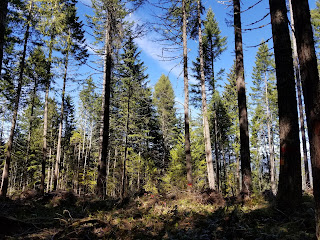Forests Forever
We use forest products every day. Its estimate the
average American uses six trees worth of paper per year.[1]
Forests provide us with building materials, fuel, and paper products. Our
forests also provide ecosystem services in the way of filtering the air we breathe,
facilitating water exchange between soil and air, and provide habitat.
Because of our high reliance on forest products, there is a
high demand for them. Worldwide it is estimated that an area the size of a
football field is cleared every 3-seconds.[2]
The reality is we will not stop using forest products. So, what we can do is
reduce our impact on timber extraction.
There are steps we can take as consumers to reduce the
impact on our forests.
1. Recycle paper products
2. Make 2-sided copies
3. Reuse old office paper as scrap paper
4. Use email instead of print mail
5. Store information as digital copies instead of printing
copies
6. Purchase forest products (timber and paper) with the Forest
Stewardship Council (FSC) label. The FSC has created responsible forest
management standards. These standards are voluntary adopted by forest managers.
To date, at least 380 million acres of forest are FSC certified.[3]
7. Reuse building materials for construction
- Look for a local supplier near you. A few suppliers in Oregon include:
- Salvage Works in Portland, Oregon https://www.salvageworkspdx.com/
- Urban Lumber Company in Springfield, Oregon https://urbanlumber.co/
- The FSC has a database to help you find products. https://us.fsc.org/en-us/market/find-products
- Examples of reclaimed wood in use:
8. Do not buy tropical woods unless guaranteed harvest from
agroforestry planation (ebony, mahogany, rosewood, teak)
9. Patronize restaurants and buy products that are not
produced on deforested land (i.e. beef, coffee, bananas)
10. Contact your congressional representative – ask them to
support forest protection.
If we all take these
little steps to reduce the impact on timber extraction big change will occur.
Look at your life and see where you can change the way you interact with forest
products. Encourage your family, friends, co-workers, and employers to take
action to reduce their impact on timber extraction.
[2] Radcliff,
Matthew and Belward, Alan. 2011. “Global Rate of Deforestation 2011”. Goddard
Media Studios. National Aeronautics and Space Administration. https://svs.gsfc.nasa.gov/10873
[3] Forest
Stewardship Council. n.d. “What we do”.




Comments
Post a Comment